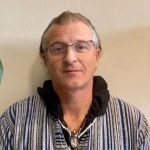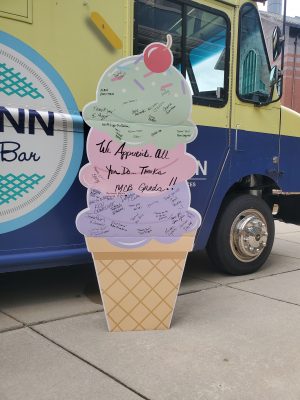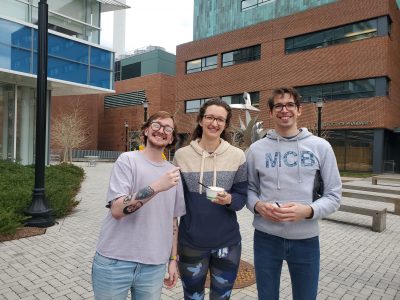"Uncovering Vulnerabilities in Genetic Subtypes of Lung Cancer"
KRAS mutant lung adenocarcinoma is the most lethal type of lung cancer and is associated with high degree of genetic heterogeneity. KRAS co-mutations can promote tumorigenesis and therapy resistance. Using KRAS-driven genetically engineered lung cancer mouse models and patient samples we have identified mechanisms by which LKB1 and KEAP1 mutations accelerate tumor growth by rewiring cancer cell metabolism and reshaping the immune microenvironment. We have identified novel therapeutic approaches to both suppress the tumor metabolism and reverse the immunosuppressive microenvironment these genetic subsets of KRAS-driven lung cancer.
About Dr. Papagiannakopoulos:
Thales Papagiannakopoulos obtained his Ph.D. in Molecular, Cellular and Developmental Biology in Dr. Ken Kosik’s lab at UC Santa Barbara (2005-2010). His research focused on uncovering the role of microRNAs in regulating embryonic stem cell pluripotency and cancer. In 2010, he started his postdoctoral studies in Dr. Tyler Jacks’ laboratory at MIT where he studied the molecular mechanisms that contribute to cancer at an organismal level, using autochthonous mouse models of cancer. He pioneered the use of novel CRISPR/Cas9-based somatic genome engineering in lung cancer genetically engineered mouse models (GEMMs). In 2015, Thales joined NYU School of Medicine as an assistant Professor in the Department of Pathology. Using CRISPR/Cas9-based genome engineering in both mouse and human pre-clinical models, his lab has developed a platform to rapidly characterize the function of clinically relevant lung cancer mutations, elucidate their mechanism of action and identify novel targeted therapies against complex genetic subtypes of lung cancer. Thales’ group has made significant progress in characterizing a major genetic subset of lung adenocarcinoma with KEAP1 and/or LKB1 mutations. Patients with these mutations have the worst prognosis of all lung cancer patients and do not respond well to standard of care chemotherapy and/or immunotherapy.
Nrf2 Activation Promotes Lung Cancer Metastasis by Inhibiting the Degradation of Bach1
https://www.sciencedirect.com/science/article/pii/S0092867419306312
To learn more about Dr. Papagiannakopoulos, visit his website at http://thalesplab.com
The symposium is named in honor of late UConn faculty members Ed and Lamia Khairallah and funded by the Dr. Edward A. Khairallah and Dr. Lamia H. Khairallah Fund for Scholarship. This fund is dedicated to the financial support of graduate students who are pursuing a degree with a concentration in Biochemistry, Cell Biology or Toxicology, and the continuing education of faculty and student colleagues via the ongoing “Khairallah Seminar Series.”
 Santiago-Martinez is a microbiologist from Universidad Nacional Autónoma de México (UNAM) and The Pennsylvania State University. He is interested in the ecophysiology of archaea and anaerobic bacteria, and how energy status influences their ability to resist environmental stress conditions, such as exposure to oxygen and nutritional starvation. His research goal is to understand the function of anaerobic microorganisms in biogeochemical cycles and host-associated microbiomes. He is also interested in bringing up-to-date knowledge of archaea to the classrooms and outreach activities, as well as promoting more inclusive science through mentoring activities and service initiatives.
Santiago-Martinez is a microbiologist from Universidad Nacional Autónoma de México (UNAM) and The Pennsylvania State University. He is interested in the ecophysiology of archaea and anaerobic bacteria, and how energy status influences their ability to resist environmental stress conditions, such as exposure to oxygen and nutritional starvation. His research goal is to understand the function of anaerobic microorganisms in biogeochemical cycles and host-associated microbiomes. He is also interested in bringing up-to-date knowledge of archaea to the classrooms and outreach activities, as well as promoting more inclusive science through mentoring activities and service initiatives.


 MCB Faculty and Staff showed our MCB Graduate students some love with an ice cream social. Students enjoyed some Dairy Bar ice cream and some photo fun!
MCB Faculty and Staff showed our MCB Graduate students some love with an ice cream social. Students enjoyed some Dairy Bar ice cream and some photo fun!
